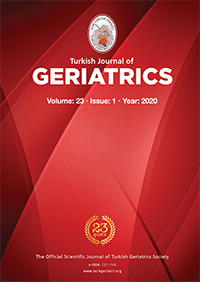2Hacettepe University, Medical School, History of Medicine and Medical Ethics, Ankara, TURKEY DOI : 10.31086/tjgeri.2020.142 Introduction: Elderly individuals frequently face end-of-life decisions. These decisions create moral burden for the family and health personnel. Aim of this study is determine the opinions of elderly about end-of-life decisions, which will act as a guide for physicians and families in clinical decision-making processes.
Materials and Method: Standardized Mini Mental Test was applied to 650 elderlies, and 448 participants with a test score 27 or more were interviewed between 1 May 2017 and 1 January 2019 using questionnaires including sociodemographic data form and scenarios that would determine their end-of-life decisions. Only statistically significant (P ? 0.05) results were presented in the results section.
Results: 72.5% (n=325) of the participants stated that they should be informed about medical diagnosis, 70.1% (n=314) stated that decision of informing the family should be left to patient and physician should inform the patient in any case. It was found that being familiar with the physician for a long time was important in fulfilling patient requests, and 79% (n=354) of the participants could consider leaving a living will and appointing a medical guardian.
Conclusion: Not talking to elderly patients with the judgment that they will not understand the concepts of elderly care, not seeing them as a decision-maker in treatment and care decisions, letting relatives make the decisions and applying these decisions are unacceptable attitudes for elderly individuals who have good mental health.
Keywords : Ageds; Advance Directives; Clinical Decision-Making; Physician- Patient Relations; Attitude
